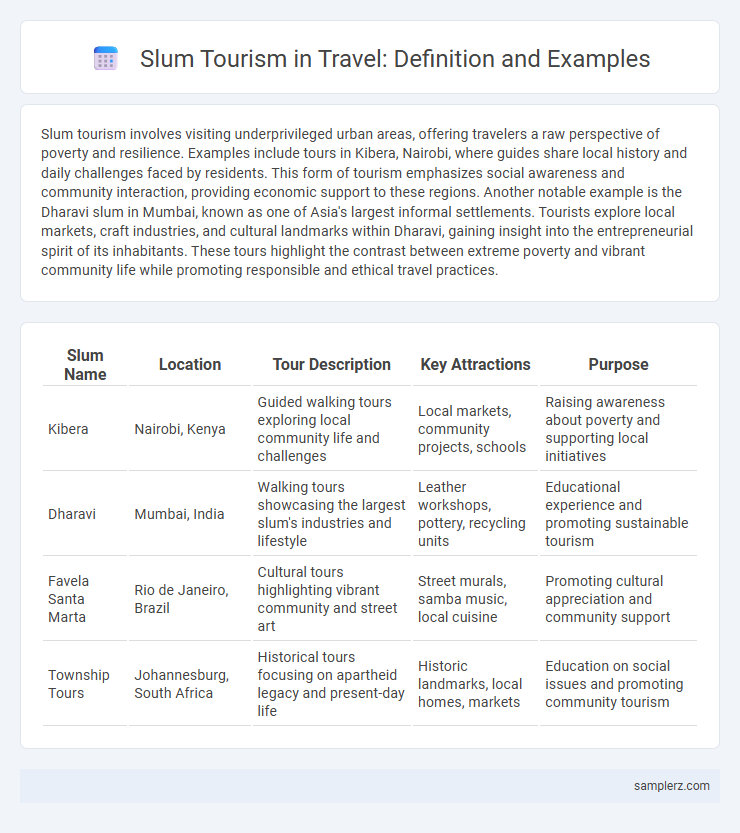Slum tourism involves visiting underprivileged urban areas, offering travelers a raw perspective of poverty and resilience. Examples include tours in Kibera, Nairobi, where guides share local history and daily challenges faced by residents. This form of tourism emphasizes social awareness and community interaction, providing economic support to these regions. Another notable example is the Dharavi slum in Mumbai, known as one of Asia's largest informal settlements. Tourists explore local markets, craft industries, and cultural landmarks within Dharavi, gaining insight into the entrepreneurial spirit of its inhabitants. These tours highlight the contrast between extreme poverty and vibrant community life while promoting responsible and ethical travel practices.
Table of Comparison
| Slum Name | Location | Tour Description | Key Attractions | Purpose |
|---|---|---|---|---|
| Kibera | Nairobi, Kenya | Guided walking tours exploring local community life and challenges | Local markets, community projects, schools | Raising awareness about poverty and supporting local initiatives |
| Dharavi | Mumbai, India | Walking tours showcasing the largest slum's industries and lifestyle | Leather workshops, pottery, recycling units | Educational experience and promoting sustainable tourism |
| Favela Santa Marta | Rio de Janeiro, Brazil | Cultural tours highlighting vibrant community and street art | Street murals, samba music, local cuisine | Promoting cultural appreciation and community support |
| Township Tours | Johannesburg, South Africa | Historical tours focusing on apartheid legacy and present-day life | Historic landmarks, local homes, markets | Education on social issues and promoting community tourism |
Understanding Slum Tourism: A New Travel Phenomenon
Slum tourism offers travelers a unique perspective by exploring impoverished urban areas such as Dharavi in Mumbai or Kibera in Nairobi, providing firsthand insight into the realities of marginalized communities. This travel trend emphasizes cultural immersion and social awareness, enabling tourists to engage with local residents and understand their daily struggles and resilience. By promoting ethical practices and local involvement, slum tourism aims to foster empathy and support sustainable development within these vulnerable neighborhoods.
Dharavi, Mumbai: Asia’s Largest Slum on the Tourist Map
Dharavi in Mumbai is recognized as Asia's largest slum and a prominent site for slum tourism, attracting thousands of visitors interested in understanding urban poverty and local culture. Guided tours showcase Dharavi's vibrant community, small-scale industries, and innovative recycling practices, offering a unique perspective on resilience and entrepreneurship. This form of travel highlights both the social challenges and economic vitality within one of the world's most densely populated informal settlements.
Favela Tours in Rio de Janeiro: Exploring Brazil’s Hidden Side
Favela Tours in Rio de Janeiro offer travelers a unique opportunity to explore Brazil's hidden side by visiting vibrant communities that showcase rich culture, resilience, and local entrepreneurship. These guided tours emphasize authentic interactions, providing insights into the daily lives, art, and social initiatives within favelas like Rocinha and Santa Marta. By promoting sustainable tourism, Favela Tours contribute to economic development and challenge stereotypes about Rio's informal settlements.
Kibera Experience: Slum Tourism in Nairobi, Kenya
Kibera Experience in Nairobi, Kenya offers an immersive slum tourism experience that highlights the daily lives, culture, and resilience of residents in one of Africa's largest informal settlements. Visitors engage with local guides who provide authentic insights into community projects, entrepreneurship, and social challenges in Kibera. This unique travel opportunity promotes sustainable tourism while fostering awareness and support for local development initiatives.
Township Tours: Uncovering the Real Cape Town, South Africa
Township tours in Cape Town offer travelers an authentic experience, exploring vibrant communities such as Khayelitsha and Langa to understand daily life beyond traditional tourist sites. These tours highlight local culture, history, and social challenges, providing economic support to residents through community-led initiatives. Visitors gain insightful perspectives on South Africa's apartheid legacy while promoting responsible and ethical tourism practices.
Rocinha Walks: A Journey Through Rio’s Vibrant Communities
Rocinha Walks offers an immersive experience through Rio de Janeiro's largest favela, showcasing vibrant street art, local markets, and community projects that highlight the resilience and culture of its residents. Visitors gain insight into daily life while supporting social initiatives aimed at improving education and employment opportunities within Rocinha. This slum tourism approach promotes ethical travel by fostering understanding and economic benefits for the community.
Manila’s Smokey Mountain: Urban Poverty Tourism in the Philippines
Manila's Smokey Mountain stands as a prominent example of slum tourism, drawing visitors into the heart of urban poverty in the Philippines. This former landfill site turned impoverished community provides a raw, immersive experience that highlights socio-economic challenges through guided tours. Slum tourism at Smokey Mountain raises awareness of living conditions while sparking debates on ethical tourism practices and sustainable development.
Soweto Sightseeing: South Africa’s Apartheid History Revealed
Soweto Sightseeing offers a compelling slum tourism experience, providing visitors with an in-depth look at South Africa's apartheid history through guided tours of key landmarks such as the Hector Pieterson Museum and Vilakazi Street. This type of travel emphasizes socio-cultural education by highlighting the resilience and everyday life within South African townships. Tourists gain valuable insight into Soweto's role in the anti-apartheid struggle while supporting local communities economically through responsible tourism.
Slumdog Tour: Walking the Backstreets of Kolkata, India
The Slumdog Tour offers an immersive experience walking through the backstreets of Kolkata, India, highlighting everyday life in the city's slums while promoting sustainable tourism. Participants gain authentic insights into local culture, community projects, and social challenges faced by residents. This tour emphasizes ethical engagement by supporting local businesses and fostering awareness about urban poverty.
Ethical Considerations: Responsible Practices in Slum Tourism
Slum tourism requires strict adherence to ethical considerations such as obtaining informed consent from local residents, ensuring tours do not exploit vulnerable communities, and prioritizing benefits for the inhabitants through community-based initiatives. Responsible practices include collaborating with local organizations to develop culturally sensitive experiences and reinvesting a portion of profits into social programs that improve living conditions. Transparent communication and respect for privacy are essential to fostering positive interactions between tourists and residents in slum tourism.

example of slum tourism in travel Infographic
 samplerz.com
samplerz.com